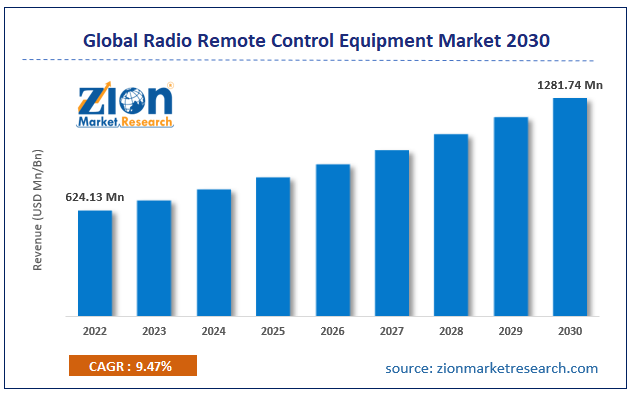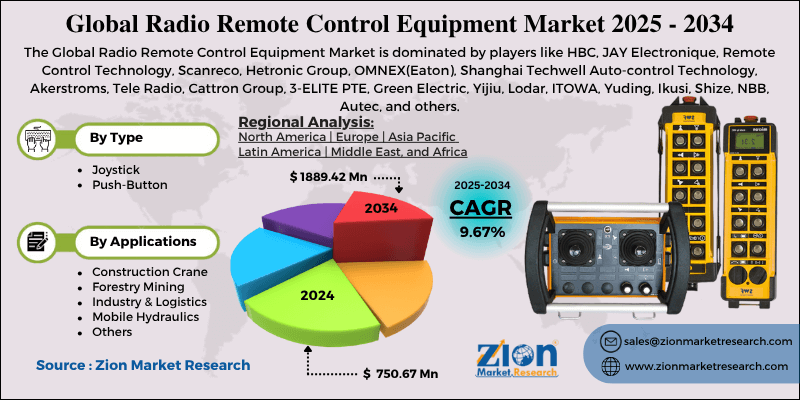Global Radio Remote Control Equipment Market Size, Share, Growth Analysis Report - Forecast 2034

Radio Remote Control Equipment Market By Type (Joystick, Push-Button), By Application (Construction Crane, Forestry Mining, Industry & Logistics, Mobile Hydraulics, Others), and By Region: Global and Regional Industry Overview, Market Intelligence, Comprehensive Analysis, Historical Data, and Forecasts 2025 - 2034
| Market Size in 2024 | Market Forecast in 2034 | CAGR (in %) | Base Year |
|---|---|---|---|
| USD 750.67 Million | USD 1889.42 Million | 9.67% | 2024 |
Radio Remote Control Equipment Market: Industry Perspective
The global radio remote control equipment market size was worth around USD 750.67 Million in 2024 and is predicted to grow to around USD 1889.42 Million by 2034 with a compound annual growth rate (CAGR) of roughly 9.67% between 2025 and 2034. The report analyzes the global radio remote control equipment market's drivers, restraints/challenges, and the effect they have on the demands during the projection period. In addition, the report explores emerging opportunities in the radio remote control equipment industry.
Radio Remote Control Equipment Market: Overview
Radio remote control equipment is used for controlling objects at a distance through the use of various radio signals transmitted by the equipment. Furthermore, the equipment is used with burglar alarms, gate openers, industrial automation systems, and automatic barrier systems. For the record, radio remote control devices make use of coding as well as FSK modulation. Moreover, the standard used by these devices is Z-Wave, Bluetooth, and Zigbee. The key parts of the equipment are the receiver and transmitter.
Key Insights
- As per the analysis shared by our research analyst, the global radio remote control equipment market is estimated to grow annually at a CAGR of around 9.67% over the forecast period (2025-2034).
- Regarding revenue, the global radio remote control equipment market size was valued at around USD 750.67 Million in 2024 and is projected to reach USD 1889.42 Million by 2034.
- The radio remote control equipment market is projected to grow at a significant rate due to increasing demand for enhanced safety and operational efficiency in hazardous environments, growing industrial automation and adoption of Industry 4.0 principles.
- Based on Type, the Joystick segment is expected to lead the global market.
- On the basis of Application, the Construction Crane segment is growing at a high rate and will continue to dominate the global market.
- Based on region, North America is predicted to dominate the global market during the forecast period.
Radio Remote Control Equipment Market: Dynamics
Key Growth Drivers: The radio remote control equipment market is propelled by increasing automation across industries such as construction, mining, oil & gas, and material handling where remote operation improves safety and productivity. Advances in wireless technologies (including LTE, 5G, and low-power wide-area networks) and improvements in battery life, range, and latency make remote systems more reliable and attractive. Rising demand for operator safety solutions, stricter workplace safety regulations, and the shift toward smart, connected equipment that supports predictive maintenance and fleet management further accelerate adoption. In addition, growth in infrastructure projects and industrial modernization in emerging economies is expanding the addressable market for versatile remote-control solutions.
Restraints: High initial purchase costs for robust, industrial-grade radio remote systems and the expense of retrofitting legacy equipment can slow adoption, especially for small and medium-sized companies. Interference, spectrum licensing constraints, and concerns about cybersecurity and unauthorized access to wireless control channels create technical and regulatory hurdles. Fragmentation in industry standards and interoperability issues among different vendors’ systems complicate integration and raise total cost of ownership. Finally, limited availability of skilled technicians to install, configure, and maintain complex remote-control systems can restrain deployment in certain regions.
Opportunities: There are strong opportunities in developing modular and retrofit-friendly solutions that let operators upgrade existing fleets affordably, and in software-defined radios and cloud-connected platforms that enable remote diagnostics, over-the-air updates, and analytics-driven optimization. Expanding into adjacent markets such as autonomous material handling, robotics, and agricultural automation can broaden revenue streams. Specialized, secure radio control solutions tailored for hazardous environments (ATEX/IECEx certified) and seamless integration with IoT and asset-management platforms offer high-value differentiation. Emerging markets undergoing industrialization present capacity-building opportunities where suppliers can partner with local integrators to capture long-term demand.
Challenges: Key challenges include maintaining reliable, low-latency control in environments with RF congestion, multipath interference, or limited spectrum access, which can compromise safety and performance. Ensuring strong cybersecurity across hardware, firmware, and cloud layers is difficult but essential, since breaches could cause equipment misuse or downtime. Rapid technological change forces manufacturers to balance innovation with backward compatibility for customers who require long product lifecycles. Finally, winning customer trust in safety-critical applications requires rigorous testing, certifications, and clear demonstrated ROI, all of which lengthen sales cycles and increase go-to-market effort.
Radio Remote Control Equipment Market: Segmentation Analysis
The global radio remote control equipment market is segmented based on Type, Application, and region. All the segments have been analyzed based on present and future trends and the market is estimated from 2025 to 2034.
Based on Type, the global radio remote control equipment market is divided into Joystick, Push-Button.
On the basis of Application, the global radio remote control equipment market is bifurcated into Construction Crane, Forestry Mining, Industry & Logistics, Mobile Hydraulics, Others.
The Regional, this segment includes the current and forecast demand for North America, Europe, Asia Pacific, Latin America,and the Middle East and Africa.
Radio Remote Control Equipment Market: Report Scope
| Report Attributes | Report Details |
|---|---|
| Report Name | Radio Remote Control Equipment Market |
| Market Size in 2024 | USD 750.67 Million |
| Market Forecast in 2034 | USD 1889.42 Million |
| Growth Rate | CAGR of 9.67% |
| Number of Pages | 217 |
| Key Companies Covered | HBC, JAY Electronique, Remote Control Technology, Scanreco, Hetronic Group, OMNEX(Eaton), Shanghai Techwell Auto-control Technology, Akerstroms, Tele Radio, Cattron Group, 3-ELITE PTE, Green Electric, Yijiu, Lodar, ITOWA, Yuding, Ikusi, Shize, NBB, Autec, and others. |
| Segments Covered | By Type, By Application, and By Region |
| Regions Covered | North America, Europe, Asia Pacific (APAC), Latin America, The Middle East and Africa (MEA) |
| Base Year | 2024 |
| Historical Year | 2020 to 2023 |
| Forecast Year | 2025 - 2034 |
| Customization Scope | Avail customized purchase options to meet your exact research needs. Request For Customization |
Radio Remote Control Equipment Market: Regional Insights
The Radio Remote Control Equipment market shows clear regional differences: North America and Europe currently lead in market share thanks to early automation adoption, strong industrial bases, and strict safety and regulatory standards that favor wired-to-wireless transitions in sectors like material handling, construction and mining. Asia-Pacific is forecast to be the fastest-growing region through 2025–2034, driven by rapid industrialization, large infrastructure and manufacturing investments in China, India and Southeast Asia, rising demand for cost-effective OEM solutions, and expanding use in logistics and ports. Latin America is expected to register steady, moderate growth as mining, agriculture and warehousing modernize and replace older control systems, while the Middle East & Africa present niche but high-value opportunities tied to energy, oil & gas, and heavy industry projects.
Overall, regional adoption will be shaped by the pace of industrial automation, safety regulation enforcement, local infrastructure spending, and availability of low-cost suppliers—factors that will keep developed markets focused on feature-rich, high-reliability systems and emerging markets focused on scalability and affordability.
Radio Remote Control Equipment Market: Competitive Analysis
The report provides a company market share analysis to give a broader overview of the key market players. In addition, the report also covers key strategic developments of the market, including acquisitions & mergers, new product launches, agreements, partnerships, collaborations & joint ventures, research & development, and regional expansion of major participants involved in the radio remote control equipment market on a global and regional basis.
The global radio remote control equipment market profiles key players such as:
- HBC
- JAY Electronique
- Remote Control Technology
- Scanreco
- Hetronic Group
- OMNEX(Eaton)
- Shanghai Techwell Auto-control Technology
- Akerstroms
- Tele Radio
- Cattron Group
- 3-ELITE PTE
- Green Electric
- Yijiu
- Lodar
- ITOWA
- Yuding
- Ikusi
- Shize
- NBB
- Autec
- Wicontek.
The global radio remote control equipment market is segmented as follows:
By Type
- Joystick
- Push-Button
By Application
- Construction Crane
- Forestry Mining
- Industry & Logistics
- Mobile Hydraulics
- Others
By Region
- North America
- The U.S.
- Canada
- Europe
- France
- The UK
- Spain
- Germany
- Italy
- Rest of Europe
- Asia Pacific
- China
- Japan
- India
- South Korea
- Southeast Asia
- Rest of Asia Pacific
- Latin America
- Brazil
- Mexico
- Rest of Latin America
- Middle East & Africa
- GCC
- South Africa
- Rest of Middle East & Africa
Table Of Content
Methodology
FrequentlyAsked Questions
Radio remote control equipment is used for controlling objects at a distance through the use of various radio signals transmitted by the equipment. Furthermore, the equipment is used with burglar alarms, gate openers, industrial automation systems, and automatic barrier systems. For the record, radio remote control devices make use of coding as well as FSK modulation. Moreover, the standard used by these devices is Z-Wave, Bluetooth, and Zigbee. The key parts of the equipment are the receiver and transmitter.
The global radio remote control equipment market is expected to grow due to rising industrial automation, increasing demand for crane and heavy machinery safety, growth in construction and manufacturing, and advancements in wireless control technologies.
According to a study, the global radio remote control equipment market size was worth around USD 750.67 Million in 2024 and is expected to reach USD 1889.42 Million by 2034.
The global radio remote control equipment market is expected to grow at a CAGR of 9.67% during the forecast period.
North America is expected to dominate the radio remote control equipment market over the forecast period.
Leading players in the global radio remote control equipment market include HBC, JAY Electronique, Remote Control Technology, Scanreco, Hetronic Group, OMNEX(Eaton), Shanghai Techwell Auto-control Technology, Akerstroms, Tele Radio, Cattron Group, 3-ELITE PTE, Green Electric, Yijiu, Lodar, ITOWA, Yuding, Ikusi, Shize, NBB, Autec, among others.
The report explores crucial aspects of the radio remote control equipment market, including a detailed discussion of existing growth factors and restraints, while also examining future growth opportunities and challenges that impact the market.
HappyClients
Zion Market Research
Tel: +1 (302) 444-0166
USA/Canada Toll Free No.+1 (855) 465-4651
3rd Floor,
Mrunal Paradise, Opp Maharaja Hotel,
Pimple Gurav, Pune 411061,
Maharashtra, India
Phone No +91 7768 006 007, +91 7768 006 008
US OFFICE NO +1 (302) 444-0166
US/CAN TOLL FREE +1 (855) 465-4651
Email: sales@zionmarketresearch.com
We have secured system to process your transaction.
Our support available to help you 24 hours a day, five days a week.
Monday - Friday: 9AM - 6PM
Saturday - Sunday: Closed






